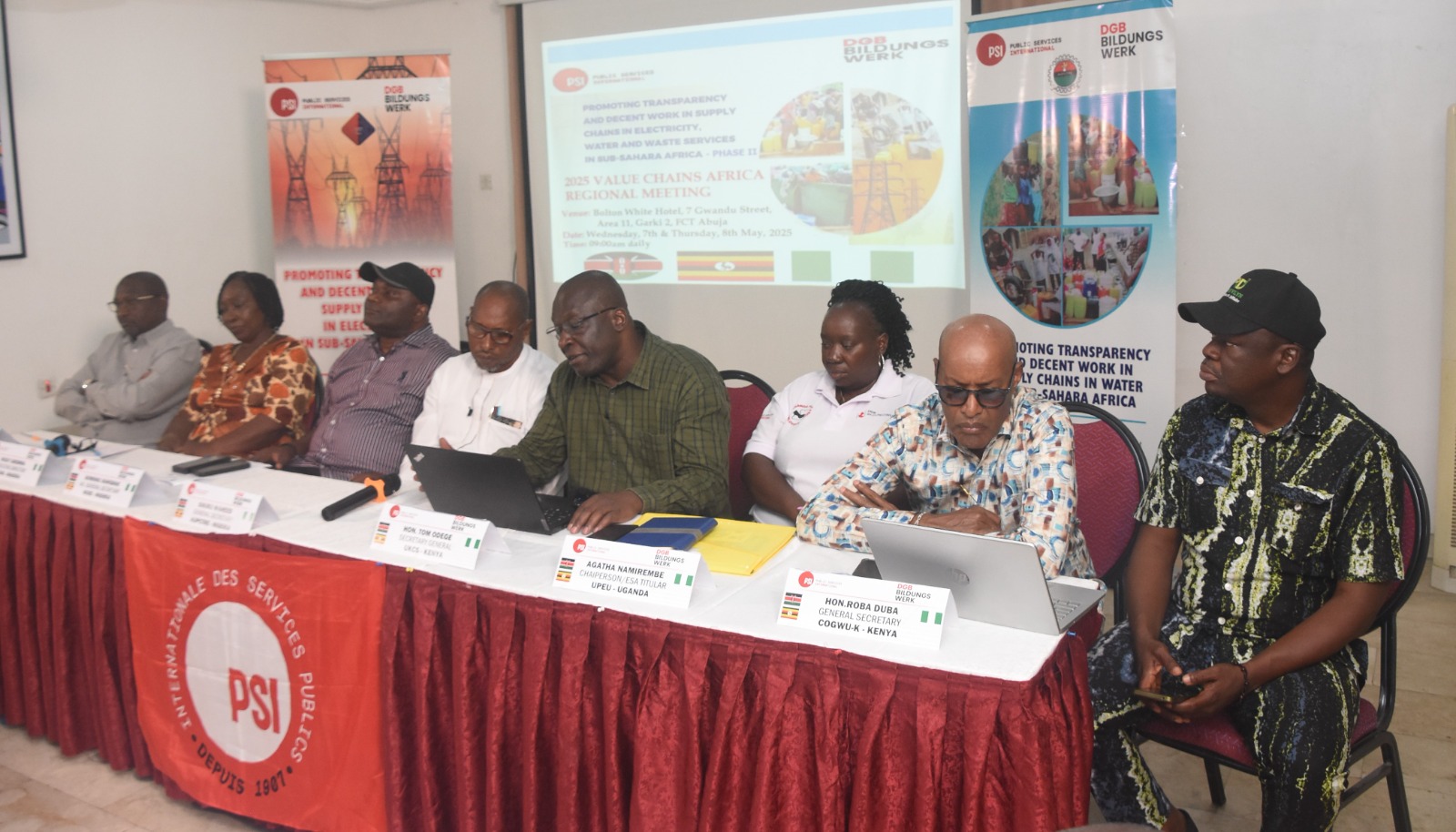
By Edu Abade
No fewer than 11 trade unions and civil society organizations have demanded immediate reversal of failed privatization programmes promoted by the World Bank and International Monetary Fund (IMF), especially in the electricity, water and waste services sectors that further impoverished Africans over the years.
 In a communiqué issued after a two-day regional meeting held on May 7 and May 8, 2025 in Abuja, the groups, drawn from Nigeria, Kenya and Uganda in collaboration with the Public Sector International (PSI) and DGB Bildungswerk Bund (DGB BW), insisted that the privatization programmes foisted on the continent by the Bretton Woods institutions largely failed and increased poverty in Africa.
In a communiqué issued after a two-day regional meeting held on May 7 and May 8, 2025 in Abuja, the groups, drawn from Nigeria, Kenya and Uganda in collaboration with the Public Sector International (PSI) and DGB Bildungswerk Bund (DGB BW), insisted that the privatization programmes foisted on the continent by the Bretton Woods institutions largely failed and increased poverty in Africa.
During the summit with the theme: Promoting Transparency and Decent Work in Supply Chains in Electricity, Water and Waste Services in Sub-Saharan Africa served as a critical platform for stakeholders to share national experiences, analyse and review the impact of privatisation on public services and formulate collective strategies to promote decent work and reclaim public control of essential services.
At the meeting, which was convened under the PSI–DGB BW project titled: Promoting Transparency and Decent Work in Supply Chains in Electricity, Water and Waste Services in Sub-Saharan Africa-Phase II, participants recognised that the widespread adoption of Public Private Partnerships (PPPs) and privatisation models in the electricity, water and waste sectors continues to undermine access to quality, affordable and accountable public services across the continent.
“Despite mounting global evidence of the systemic failures of the privatization models, especially in Africa, governments remain under pressure from International Financial Institutions (IFIs) such as the World Bank and IMF to privatise public assets and utilities.
“The policy prescriptions, framed under the guise of “efficiency” and “reform,” fail to account for the lived realities of African communities and public sector workers. Rather than delivering improved services, privatisation has deepened inequality, entrenched corruption and weakened public institutions,” the groups stated.
The groups pointed out that privatisation has failed to serve Africa’s public interest, leading to escalating user fees and shrinking service coverage, restricting access only to those who can afford to pay.
“Public revenues have been eroded. Essential resources that could otherwise be reinvested to enhance service delivery and uphold decent working conditions have been diverted to private profit. Privatisation has increased vulnerability to corruption and conflict of interest, with opaque contracts and limited accountability mechanisms.
“African governments, including Nigeria, Kenya and Uganda, have accumulated long- term debt from IFI-financed privatisation ventures that have not yielded the promised improvements in service delivery or equity. Privatisation has taken diverse and increasingly covert forms, including corporatisation, concessions, subletting and the rise of Independent Power Producers (IPPs), which are effectively privatisation through the backdoor.
“The supply chains of water, electricity, and waste services are characterised by precarious employment conditions, marked by job insecurity, low wages, wage arrears and absence of social protection like pensions and unemployment insurance, which directly undermines service quality, worker dignity and community well-being,” the communiqué added.
The Amalgamated Union of Public Corporations, Civil Service Technical and Recreational Services Employees (AUPCTRE), National Union of Electricity Employees (NUEE), Citizens Free Service Forum (CFSF), Renevlyn Development Initiative (RDI) and Child Health Organisation from Nigeria endorsed the communiqué.
Others are the Union of Kenya Civil Servants (UKCS), County Government Workers Union–Kenya (COGWU-K), Kenya Electrical Trade and Allied Workers Union (KETAWU), Kenya Commercial Food and Allied Workers Union (KUCFAW), as well as the Uganda Electrical Allied Workers Union (UEAWU), Uganda Local Government Workers Union (ULGWU) and Uganda Public Employees Union (UPEU).
The groups also lamented that promoters of privatization have introduced governance models that marginalise workers’ voices, eroding long-standing tripartite arrangements and weakening democratic oversight over public services.
Following robust deliberations, the participants recommended that African governments, especially those of Nigeria, Kenya and Uganda should immediately reverse all existing privatisations in the water, electricity and waste sectors and suspend any ongoing or planned discussions on the privatisation of public assets.
They equally demanded rejection of all IFI-driven initiatives that promote the commodification of essential public services, including through PPPs, corporatisation, concessions and other profit-driven models that undermine universal access and human rights.
Other demands include adoption and scaling up of Public-Public Partnerships (PUPs) as a viable, democratic and socially just alternative. PUPs have shown proven success in delivering quality public services without profiteering motives.
Governments should reinvest in human capital within the public sector and allocate sufficient resources for the training, motivation, and retention of public sector workers to promote efficiency, innovation and transparency.
They should ratify and fully implement key International Labour Organization (ILO) Conventions, particularly: C.87 (Freedom of Association), C.98 (Right to Organise and Collective Bargaining), C.151 (Labour Relations in the Public Service) and C.154 (Collective Bargaining in the Public Sector), which are essential for upholding decent work standards and ensuring that workers have a voice in shaping service delivery reforms.
Governments should also strengthen social dialogue by restoring and respecting tripartite governance frameworks that enable meaningful engagement between governments, employers, and workers’ organisations in shaping public service policy.
“This communiqué stands as a unified voice of public service trade unions and allied civil society organisations committed to reclaiming public control of public utilities and essential services in Africa.
“The delegates urge all African governments, particularly those of Nigeria, Kenya and Uganda, to put people before profits by halting the privatisation of essential services and reaffirming the public sector as the cornerstone of democratic development, equity and sustainable livelihoods. Public services are not commodities. They are a right, a duty and a public good. The fight to protect them is a fight for Africa’s future,” they concluded.












xcrj4p
5gfcbn